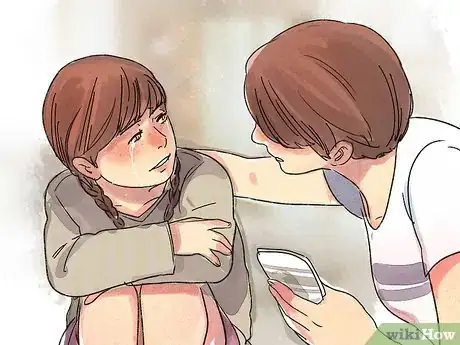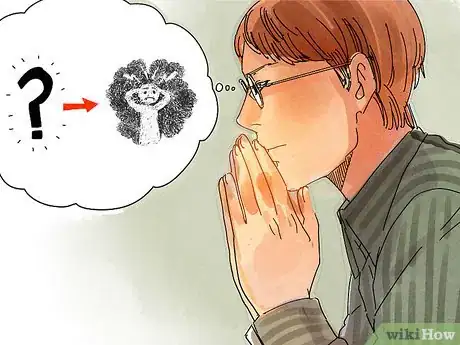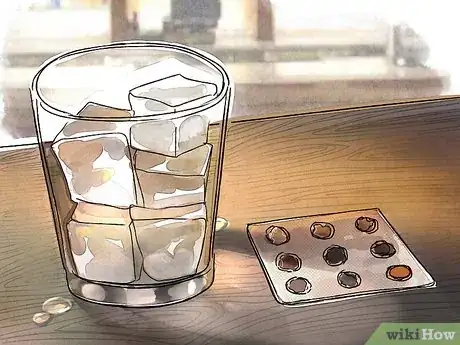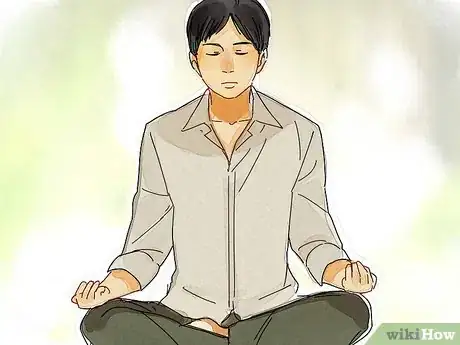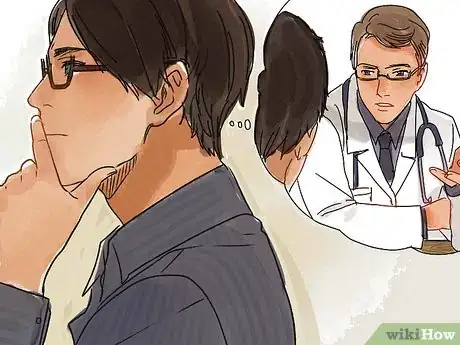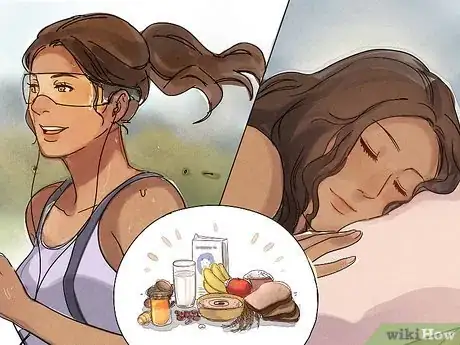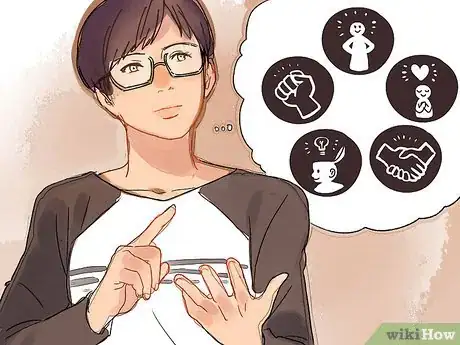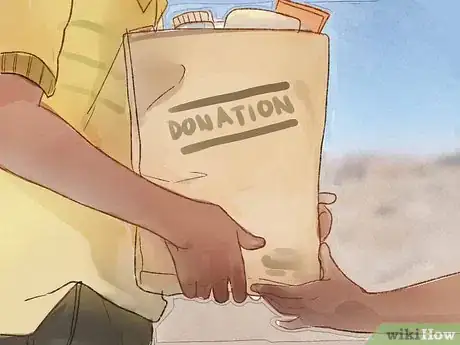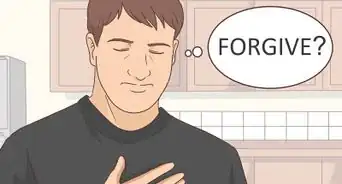This article was co-authored by Catherine Boswell, PhD. Dr. Catherine Boswell is a Licensed Psychologist and a Co-Founder of Psynergy Psychological Associates, a private therapy practice based in Houston, Texas. With over 15 years of experience, Dr. Boswell specializes in treating individuals, groups, couples, and families struggling with trauma, relationships, grief, and chronic pain. She holds a Ph.D. in Counseling Psychology from the University of Houston. Dr. Bowell has taught courses to Master’s level students at the University of Houston. She is also an author, speaker, and coach.
There are 40 references cited in this article, which can be found at the bottom of the page.
This article has been viewed 1,084,451 times.
Do you wake up in the morning feeling like there's no good reason to get up and face the day? Emptiness is a feeling all humans experience from time to time, and it's not easy to pull yourself away from it. Feeling empty all or most of the time can be a symptom of an underlying condition, such as depression, and you should seek the help of a licensed mental health professional if you almost always feel empty. But to stop feeling empty when the sensation only bubbles up occasionally, there are simple things you can do yourself, such as journaling, trying new things, and making new friends. Filling your life with love and finding meaning in daily living should help ward away temporary feelings of emptiness and may even help if you're striving to recover from long-term emptiness.
Steps
Filling Your Life with Love
-
1Spend time with people who love you. This may be your family or it may be a group of trusted friends. Spending time with people who really know you and love you for who you are is a remedy for emptiness. Focus on building and strengthening your relationships with these people. You can find meaning in the simple act of spending time with a loved one who takes pleasure in your company. Spending time with friends and family can also help reduce stress and give you a deeper sense of belonging.[1]
- Reduce the time that you spend with people who are harmful to you, even if they don’t mean to be. If you must spend time around someone who is hurting your self-esteem or making you feel powerless, make sure your meetings always have a time cap.
-
2Make a new friend or enter a romantic relationship. The pleasure of meeting someone you connect with and letting the relationship grow in unexpected ways is a terrific antidote to feelings of emptiness. A new friend or love interest can provide emotional support and help you have rich new experiences and show you that you're an interesting, lovable person. Suddenly the world can seem like it has a lot more to offer than you previously thought. Making friends can also help you to have a deeper sense of purpose and belonging.[2]
- Sometimes it's difficult to make new friends and meet people, especially in later years when you're no longer in school. Joining clubs, taking classes, or spending time in a favorite hangout are good ways to meet people.
- Practice being more generous with your time and saying "yes" when you're invited to do something. If you feel you never have enough time to give new relationships, they won't grow.
Advertisement -
3Adopt an animal companion. Research has shown that having a pet can make life feel fuller and more meaningful. People who own pets are also less likely to suffer from depression and may experience health benefits from owning a pet as well. Having a companion animal that depends on you for care can also help make your life seem more meaningful. Consider adopting a cat or dog from a local shelter to reduce your feelings of emptiness.[3]
-
4Be kind to others. Performing random acts of kindness can help you feel more fulfilled by refocusing your attention on other people. Look for small ways that you can demonstrate kindness to others. The kind acts that you perform will make other people feel good, which may help you to feel more fulfilled.[4]
- For example, you could offer a compliment to a stranger such as, “I love your dress! It is so beautiful.” Look for ways to show kindness in whatever situation you are in. Even something as simple as smiling and nodding at people throughout the day might help to brighten someone’s day and help you to feel more fulfilled.
Understanding Why You Feel Empty
-
1Talk to a trusted friend about how you're feeling. Keeping your feelings bottled up can cause stress and be damaging to your relationships and your health over time.[5] Sometimes just talking about your feelings can make them go away or decrease.[6] Talk to someone who cares and understands you, or at least, whom you trust; it can make a big difference.
-
2Start a journal to track your thoughts and feelings. Journaling can help you to understand your feelings of emptiness better and it is also a great way to relieve stress and anxiety.[7] To get started with journaling, choose a comfortable place and plan to devote about 20 minutes per day to writing. You can start by writing about how you are feeling or what you are thinking, or you can use a prompt.[8] Some prompts you might use include:[9]
- When did you first notice your emptiness? How long has it been there? How old is your emptiness?
- What emotions do you experience when you are feeling empty?
- Are you prone to feeling empty during certain times or in certain places? What do you notice about your environment when you are feeling most empty?
- What kind of thoughts do you have when you are feeling empty?
-
3Look for symptoms of depression. Depression manifests differently in different people, but low mood and feelings of emptiness or worthlessness are very common symptoms.[10] Depression can come in waves, where you feel okay for a while and then very low for weeks or even months, or it can be more of a steady feeling. Depression is also very common; about 6.7% of US adults experience major depressive disorder. Women are 70% more likely to have depression than men.[11] If you think you may be experiencing depression, you are not alone. Seek treatment from your physician or a mental health professional if you experience any of the following symptoms of depression:[12]
- Persistent feelings of sadness, anxiety, or “emptiness”
- Feeling hopeless or pessimistic
- Feeling guilty, worthless, or helpless
- Unusual irritability or restlessness
- Changes in your mood or behavior
- Loss of interest in things you used to enjoy
- Fatigue
- Changes to sleep habits
- Changes to your weight
- Thoughts of harm to yourself or others
- Aches and pains that do not appear to get better with treatment
-
4Consider whether you have experienced a loss. Bereavement is another common cause for feeling empty. While the deep feeling of grief is most common after the death of a loved one, it can be a response to any loss, including the loss of a pet, loss of your job, experiencing your children moving out, loss of your health, or any other significant life change.[13] [14] Feelings of loss and grief can produce a variety of other emotions, including sadness and emptiness, and they can also affect other areas of your life, such as appetite, concentration, and habits.[15] If you have experienced a loss or change that may be causing feelings of grief and emptiness, consider sharing your feelings with someone you trust, such as a friend or loved one.[16] You may also benefit from seeing a counselor who is trained in handling bereavement.[17]
- While many people believe there are “five stages” of grief, this is actually a misconception. Elisabeth Kübler-Ross’s “five stages” -- denial, anger, bargaining, depression, and acceptance -- refer to her work on death and dying in 1969. However, Kübler-Ross used these stages to describe a person’s feelings regarding his or her own death; they are not a scientific framework for all grief.[18] You may experience all, some, or none of these stages, and that is okay -- your grief is uniquely your own, and each person mourns differently.[19]
-
5Determine whether addiction may be a concern. Use of certain substances is another common cause of emptiness. Substances such as alcohol, illegal drugs, and misused prescription drugs can cause physical dependence on them. This can have a serious effect on your mood, thoughts, and behavior.[20] Often, people fall into using these substances because they feel like there is a “hole” in their lives that the substance can fill. If you think you may have trouble with substance use, you are not alone: in 2012, about 7.2% of the US population was diagnosed with Alcohol Use Disorder (AUD).[21] Many others suffer from Substance Use Disorder, which involves other substances, such as marijuana, stimulants like cocaine or meth, hallucinogens like LSD, and opoids like heroin..[22] If you are worried that you may have a problem, ask yourself the following questions. In the last year, have you:
- been in a situation where you ended up using more of the substance than you intended to?
- tried unsuccessfully to cut down on using the substance?
- spent a lot of time using or trying to obtain the substance?
- experienced cravings to use the substance?
- had to use much more of the substance to get the same effect as when you first started using it?
- experienced withdrawal symptoms such as trouble sleeping, shakiness, clammy skin, irritability, depression, anxiety, nausea, or sweating?
- experienced the substance interfering in your daily life or responsibilities?
- continued to use the substance even if it was causing trouble for family or friends?
- stopped participating in things you used to enjoy in order to use the substance?
- used the substance in dangerous situations, such as driving or operating machinery?
- Addiction has a strong hereditary component. For example, relatives of people who have alcohol abuse problems are more likely to experience addiction issues themselves, independent of whether they even knew each other.
- If you are struggling with a dependence on drugs and/or alcohol, talk to your therapist about this problem. You may need to be treated for addiction in order to stop feeling empty.[23]
-
6Examine your behavior to see whether you may have borderline personality disorder (BPD). People who suffer from BPD often report feelings of emptiness. People with a personality disorder experience persistent patterns of unstable feelings and behavior that cause distress or social impairment. People with BPD have trouble regulating their thoughts and feelings. They are prone to reckless behavior and have poor impulse control. Their relationships with others tend to be unstable.[24] About 1.6% of US adults have a diagnosis of BPD in any given year.[25] BPD can be treated effectively with professional guidance.[26] If you experience any or several of the following signs of BPD, consult with a mental health professional:
- You make extreme efforts to avoid abandonment, which may be real or imagined. You often believe that you will be abandoned or separated from a loved one. You react negatively, such as becoming extremely angry or fearful, even when the separation is temporary (such as your spouse going to work). You are very afraid of being alone.
- You alternate between idealizing and demonizing people you have been in relationships with. People with BPD often begin relationships by putting the other person on a pedestal, seeing them as perfect or ideal. After some time, you begin to think the other person does not care enough about you or contribute enough the relationship. Your relationships are commonly unstable.
- You have an unstable sense of your own identity. People with BPD struggle with maintaining a stable sense of themselves, their identity, and their self-image.
- You are very reckless or impulsive. This is especially true of self-harming. You may do reckless things such as drunk driving, gambling, substance abuse, or risky sexual behavior.
- You frequently consider self-harming and make suicidal threats. You may harm yourself through things such as cutting, scratching, or burning. Or you may threaten to hurt yourself to gain attention from others.
- You often experience extreme mood swings. These moods shift frequently and are often very intense, such as moving from joy to despair.
- You experience chronic feelings of emptiness. You may often feel empty or bored, or like you need something to do.
- You have trouble controlling your anger. Many things are likely to provoke your anger, and you respond with outbursts that may include bitterness, sarcasm, or verbal outbursts. You are particularly likely to be angry if you believe someone is uncaring toward you.
- You sometimes feel paranoid about others, or don’t feel as though your environment is “real.”
-
7Meditate to explore your feelings of emptiness. Meditation can also help you to get in touch with your feelings of emptiness and begin to understand them better. Research has shown that 30 minutes of meditation per day can help change behavior and brain function, reducing stress, anxiety, and depression.[27] To get started with meditation, sit in a quiet place, close your eyes, and focus on your breathing. Use the following questions to help you develop your understanding about your emptiness through your meditation.
- Notice how you are feeling in the moment. Do you feel any sense of emptiness or lack, such as a lack of worthiness, clarity, understanding, or a lack of peace or love? Accept that you have emptiness in the moment.
- Notice how you experience emptiness. Where do you feel the emptiness in your body? How much space does it take up?
- Consider your emptiness. Does it bring up memories from the past? What emotions are present as you notice your emptiness?
-
8Seek help from a licensed mental health professional. Talking to a therapist about how you have been feeling can help you to understand and work through your feelings of emptiness. Your feelings of emptiness may indicate that you are depressed or that you might have another underlying condition. Particularly if you show signs of depression, substance use problems, or BPD, you should seek help from a mental health professional.[28]
- Treatment for depression is often two-pronged, using psychotherapy and, if necessary, prescription medication such as SSRIs (Prozac, Zoloft, Lexapro) or SNRIs (Effexor, Cymbalta). Cognitive-behavioral therapy (CBT) and interpersonal therapy (IPT) are both effective at treating depression. CBT teaches you how to identify and reduce unhelpful patterns of negative thinking and learn ways to think productively and helpfully. IPT focuses on helping you work through relationships that may be causing you problems.[29]
- Several types of psychotherapy are helpful to work through grief, although complicated grief treatment (CGT) appears to work best for people who have struggled with grief for a long time.[30]
- Treatment for alcohol and substance use disorders often focuses on individual and group counseling but may also include medication if necessary. CBT is commonly used to treat alcohol use disorder.[31]
- Treatment for BPD is psychotherapy using Dialectical Behavioral Therapy (DBT). DBT focuses on learning to identify and regulate your emotions, tolerate stress, apply mindfulness, and interact with others in a healthy, productive way. You will learn ways to cope with your emotions, as well as social skills to help you interact with others.
Finding Meaning in Everyday Life
-
1Practice mindfulness. Mindfulness involves being aware of your thoughts, feelings, and experiences in the present moment without judgment. Research has shown significant benefits to mindfulness, including the reduction of stress and anxiety problems.[32] Mindfulness can even rewire your brain’s responses to stressors and help you feel more connected to others.[33] Learning to be more aware of your thoughts and feelings, and learning to acknowledge them without judging them or yourself, can help you feel more peaceful, empathetic, and satisfied. You can practice mindfulness at home, through meditation, or by taking a course. Here is an exercise to get you started:
- Look at, name, and touch 5 different objects, noticing each object’s color, texture, temperature, and weight.
- Look at, taste, and smell foods during dinner or pleasant floral scents during a walk, noticing their colors, texture, taste, and aroma.
- Close your eyes and listen for different sounds. Notice their tempo, strength, and volume.
- Mindfulness meditation has also been shown to be very helpful. The Mindful Awareness Research Center at UCLA has several online guided meditations in MP3 form. You can find their list of free guided meditations at http://marc.ucla.edu/body.cfm?id=22.
-
2Do something new. If you're feeling empty every day, you're probably stuck in some type of rut. What routines and patterns might be getting you down? Find a way to inject some new energy into your life. Changing your routine or even finding 30 minutes per day to try something new can help fill the emptiness. While life can feel like it’s filled with emptiness, you can always find new meaning and desires.[34]
- For example, if getting up and going to school or work every day is what's getting you down, figure out a way to make the situation more interesting. Start a new extracurricular activity to help yourself get excited to go to school, or volunteer to work on a new project at work.
- Try doing something slightly outside your comfort zone. Making improvements in a new area will give you something interesting to think about and help you build up your confidence.
- Even small changes can end up making a big difference. Try out a dish from a cuisine that's new to you, bike to work instead of driving, or start doing yoga in the morning before school.
- Changing your personal environment can also help. Replace drab curtains in your bedroom with something brighter, paint the walls a new color, get rid of clutter, and introduce some interesting artwork.
-
3Pursue goals and interests that matter to you. In order to feel fulfilled, you should work towards goals and interests that matter to you. Don’t let others control the goals or interests that you choose to pursue. If you are not pursuing goals and interests that matter to you, you may need to readjust your pursuits to make sure you're on a track that you feel good about.[35]
- If you're in school, consider whether you are studying what you want to study, or what your parents want you to study.
- Other outside pressures can also have a negative effect on the decisions we make. Decide if you are doing what you really want to do, or if you are doing something that will look impressive to others.
- If you determine that there are forces or people preventing your life from being self-directed, take steps to change your situation. Once you have more control over things, you might see the feeling of emptiness subside.
-
4Look for meaning in the everyday. When life feels like drudgery, it can help to take time to find beauty and meaning in small, everyday things to put everything into a larger context or perspective. What makes you feel alive and joyful? When you find something that seems to give you a boost, make it a consistent part of your life. Here are a few ideas for making the mundane feel more meaningful:[36]
- Practice gratitude. Taking a few moments each day to think about what you are grateful for and why can help make your life feel more meaningful.[37] You can speak or even write down your gratitude to reinforce it. For example, you might say or write, “I am so thankful the sun is out today; it’s beautiful!” or “I am so thankful for my caring family; they make me feel so special.”
- Don't deny yourself your favorite foods. If you love chocolate, have some! You don't have to go overboard, but give yourself permission to enjoy a little every day.
- Go outside and breathe fresh air. Research has shown that spending time outside makes people feel more alive and energetic.[38] Spend some time outside every single day, rain or shine. Focus on breathing in fresh air and noticing the natural world in a deeper way.
- Take time to make your world richer and more pleasant. Turn seemingly trivial tasks into positive rituals. Sit down and read the newspaper while you're drinking your morning coffee or tea instead of dashing out the door. Take a long, hot bath on the weekend instead of a shower.
- Keep your home environment pleasant. Fold your laundry neatly before putting it away. Wash the dinner dishes before you go to bed. Make your bed in the morning. Air your home out by opening the windows and letting some light and wind inside. Don't neglect to do spring cleaning. Maybe you feel you don't have time for all this, or that it doesn't matter, but when your home feels fresh and clean, the mundane parts of life are easier to bear.
-
5Take good care of yourself. Exercise, healthy food, rest, and relaxation are all important components of a meaningful life.[39] By taking good care of yourself, you are sending your mind signals that you deserve to be taken care of and that your life has value. Make sure that you are devoting enough time to meeting your basic needs for exercise, food, sleep, and relaxation.[40]
- Aim for 30 minutes of exercise per day.
- Eat a balanced diet of healthy whole foods like fruit, vegetables, whole grains, and lean proteins.
- Get 8 hours of sleep per night.
- Set aside at least 15 minutes per day to practice yoga, do deep breathing exercises, or meditate.
Identifying Your Values
-
1Identify your values. Reminding yourself of what you value in life and what you value about yourself can help you feel fulfilled rather than empty. Our values, or core beliefs about life, are usually based on our experiences throughout our lives, but we may not always take time to consciously examine them. In order to seek out your values, you will need to spend some time in reflection. Identify your values by writing your answers to the following questions:[41]
- Identify the two people you most admire. Which of their qualities make you admire them and why?
- If your house was on fire, and you could only save 3 things, which would you choose and why?
- What topics or events get you fired up? What about these topics are important to you? Why?
- Identify a moment when you felt fulfilled and content. What about that moment made you feel fulfilled? Why?
-
2Determine which qualities match up with your values. After you have finished answering these questions, try to figure out what qualities correspond with your values. In other words, read your answers and decide what qualities best match up with your values.[42]
- For example, if you chose to bring a favorite book, a family heirloom, and a gift from your best friend, you might say that this means you value intelligence, loyalty, and friendship. Therefore, a few of your qualities might be that you are intelligent, loyal, and a good friend.
-
3Think about activities that would allow you to embrace your values. Once you have determined what you value most and what your qualities are, you can begin to determine what activities would make you feel fulfilled. Make a list of these activities and choose at least one of them to add to your life.
- For example, if you have “Community” as a value, you could volunteer for your neighborhood watch, serve as a tutor at your school, or work at a soup kitchen. If you have “Faith” as a value, you could look for ways to incorporate your faith into more areas of your life, such as going on a mission trip or visiting your church, temple, mosque, or another place of worship more regularly.
- By living a “value-congruent” life (meaning the choices you make and your life path align with your values), you are more likely to feel fulfilled and happy.[43]
Warnings
- Don't try to mask serious clinical depression with flurries of activity or endless visitors. Talk about your feelings with trusted family or friends. If you don't feel better soon, seek professional help.⧼thumbs_response⧽
References
- ↑ https://pubmed.ncbi.nlm.nih.gov/28695369/
- ↑ https://pubmed.ncbi.nlm.nih.gov/15588454/
- ↑ https://pubmed.ncbi.nlm.nih.gov/30209428/
- ↑ https://pubmed.ncbi.nlm.nih.gov/29702043/
- ↑ https://pubmed.ncbi.nlm.nih.gov/25867166/
- ↑ Catherine Boswell, PhD. Licensed Psychologist. Expert Interview. 29 December 2020.
- ↑ https://pubmed.ncbi.nlm.nih.gov/22830509/
- ↑ Catherine Boswell, PhD. Licensed Psychologist. Expert Interview. 29 December 2020.
- ↑ https://www.urmc.rochester.edu/encyclopedia/content.aspx?ContentTypeID=1&ContentID=4552
- ↑ http://www.nimh.nih.gov/health/topics/depression/index.shtml
- ↑ http://www.nimh.nih.gov/health/topics/depression/index.shtml#part_145396
- ↑ http://www.nimh.nih.gov/health/topics/depression/index.shtml#part_145397
- ↑ http://www.nlm.nih.gov/medlineplus/bereavement.html
- ↑ http://cmhc.utexas.edu/griefloss.html
- ↑ http://www.cancer.gov/about-cancer/advanced-cancer/caregivers/planning/bereavement-pdq#link/stoc_h2_2
- ↑ https://pubmed.ncbi.nlm.nih.gov/30234359/
- ↑ https://pubmed.ncbi.nlm.nih.gov/26415735/
- ↑ http://www.ekrfoundation.org/five-stages-of-grief/
- ↑ http://www.centerforloss.com/who-are-you/i-want-to-help-someone-who%E2%80%99s-grieving/
- ↑ http://www.health.harvard.edu/addiction/substance-addiction
- ↑ http://www.niaaa.nih.gov/alcohol-health/overview-alcohol-consumption/alcohol-use-disorders
- ↑ http://www.samhsa.gov/disorders/substance-use
- ↑ http://www.health.harvard.edu/addiction/substance-addiction
- ↑ http://www.nimh.nih.gov/health/topics/borderline-personality-disorder/index.shtml
- ↑ http://www.nimh.nih.gov/health/publications/borderline-personality-disorder/index.shtml#pub7
- ↑ http://www.nimh.nih.gov/health/topics/borderline-personality-disorder/index.shtml#part_145391
- ↑ https://pubmed.ncbi.nlm.nih.gov/31083878/
- ↑ https://pubmed.ncbi.nlm.nih.gov/25370281/
- ↑ http://www.nimh.nih.gov/health/topics/depression/index.shtml#part_145399
- ↑ http://www.ncbi.nlm.nih.gov/pmc/articles/PMC2691160/
- ↑ http://www.samhsa.gov/treatment/substance-use-disorders#alcohol
- ↑ http://www.health.harvard.edu/blog/mindfulness-meditation-may-ease-anxiety-mental-stress-201401086967
- ↑ http://news.harvard.edu/gazette/story/2012/11/meditations-positive-residual-effects/
- ↑ https://pubmed.ncbi.nlm.nih.gov/32092180/
- ↑ https://pubmed.ncbi.nlm.nih.gov/28150138/
- ↑ https://pubmed.ncbi.nlm.nih.gov/21207245/
- ↑ http://il.nami.org/M&G%20Final%2010.11.13.pdf
- ↑ http://www.rochester.edu/news/show.php?id=3639
- ↑ https://pubmed.ncbi.nlm.nih.gov/25492721/
- ↑ https://pubmed.ncbi.nlm.nih.gov/29947566/
- ↑ https://pubmed.ncbi.nlm.nih.gov/30625160/
- ↑ https://pubmed.ncbi.nlm.nih.gov/30625160/
- ↑ http://www.ncbi.nlm.nih.gov/pubmed/19450005
About This Article
If you experience feelings of emptiness now and again, there are some simple things you can do, such as journaling, trying new things, and making new friends, to help you feel more connected. Keep a journal to track your thoughts and feelings so you can better understand when you feel empty and what helps you feel better. For example, if your emptiness comes from a feeling of boredom or being stuck in a rut, try doing something slightly outside of your comfort zone. Even small changes can make a big difference, so alter your morning routine or try a new dish from your favorite cafe. Alternatively, if your emptiness stems from not having enough love or fulfillment in your life, then try joining a club, taking a class, or spending time at a favorite hangout to meet people with similar interests. To learn how to adopt an animal to combat feelings of emptiness, keep reading!



